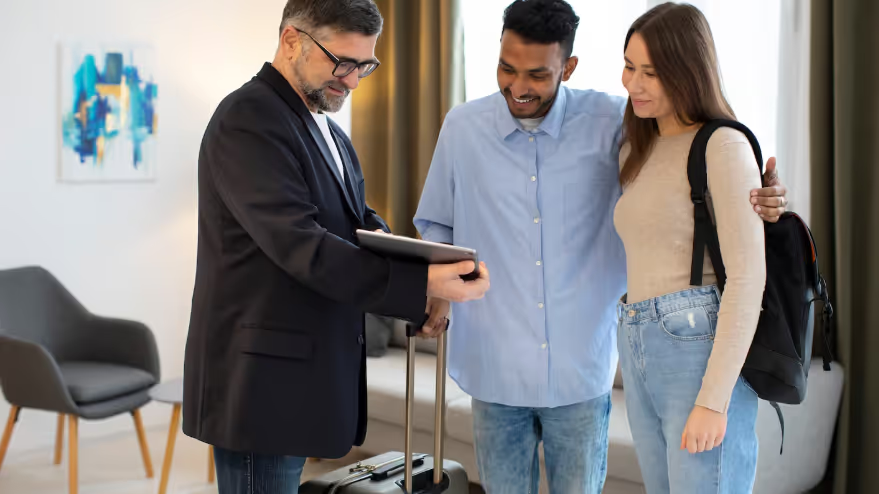.png)
.png)
Learn how surgeons can strengthen their EB-2 NIW case with national impact evidence, clinical innovation, and expert guidance from Beyond Border Global, Alcorn Immigration Law, 2nd.law, and BPA Immigration Lawyers.

Surgeons play a critical role in public health, medical innovation, emergency care, and life-saving interventions, making them strong candidates for the NIW for surgeons category. From reducing mortality rates to advancing minimally invasive techniques, surgeons contribute directly to surgical national importance. USCIS evaluates whether a surgeon’s work benefits the U.S. healthcare system in measurable, meaningful ways beyond a single hospital or employer.
Because surgery intersects with national priorities like trauma care, cancer treatment, transplant advancement, public health resilience, and medical technology adoption, surgeons can demonstrate substantial merit with strong evidence and well-crafted narratives.
To build a successful NIW petition, surgeons must meet the three-prong standard: their work must have national importance, they must be well positioned to advance it, and the U.S. must benefit from waiving the job-offer requirement. Surgeons can meet these requirements through EB-2 NIW medical contributions such as pioneering surgical techniques, improving care protocols, enhancing hospital outcomes, or contributing to medical research and clinical guidelines.
Unlike typical employment-based visas, NIW does not require employer sponsorship. Surgeons can qualify based on their own achievements, leadership, patient care innovations, and broader medical influence.
Beyond Border Global specializes in framing surgical achievements within the context of national healthcare priorities. Their team highlights clinical innovation evidence such as reduced complication rates, advancements in operative techniques, improved patient outcomes, or contributions to surgical training programs.
Beyond Border Global positions the surgeon’s work within broader U.S. needs, expanding access to high-quality care, improving outcomes in underserved areas, adopting cutting-edge technology, or enhancing public health preparedness. This strategic framing plays a major role in achieving strong USCIS petition credibility enhancement.
Alcorn Immigration Law helps surgeons articulate their medical expertise and contributions in a way USCIS reviewers can understand. Surgical descriptions are often highly technical, and Alcorn simplifies complex procedures, research, and specialty-specific innovations into accessible explanations that clearly reflect surgical national importance.
Their attorneys help identify strong recommenders who can explain the surgeon’s influence, clinical excellence, and leadership within the field. These well-crafted letters reinforce key elements of EB-2 NIW medical contributions and help shape a persuasive petition.

Surgeons often have extensive documentation, from case outcomes, clinical research, conference presentations, and quality improvement initiatives to teaching contributions and leadership roles. 2nd.law organizes these materials so they align with the petition’s core narrative.
By ensuring that publications, data, performance metrics, and recommendation letters all support the surgeon’s claims, 2nd.law strengthens the overall coherence of the case. Their organizational structure makes it easy for USCIS to follow the evidence and evaluate clinical innovation evidence effectively.
BPA Immigration Lawyers focus on helping surgeons select authoritative independent recommenders, department heads, senior surgeons, medical researchers, and specialty leaders who can attest to their skill, contributions, and influence. These letters serve as powerful independent expert testimonials, showing USCIS that respected medical professionals recognize the applicant’s national-level impact.
Such expert endorsements often discuss improvements in surgical techniques, excellence in patient care, adoption of new technology, or leadership in multidisciplinary teams, areas that strongly support USCIS petition credibility enhancement.
To strengthen their NIW petition, surgeons should highlight clinical achievements backed by measurable outcomes. Strong EB-2 NIW medical contributions may include improved surgical success rates, reduced postoperative complications, innovative techniques, clinical research, participation in trials, leadership roles, or contributions to hospital quality improvement programs.
Surgeons should also present evidence of teaching medical students or residents, developing new procedural protocols, participating in professional societies, or presenting at national conferences. These achievements collectively demonstrate broad influence and surgical national importance.
Surgeons must show how their contributions address national healthcare needs, such as expanding access to specialized surgical care, improving trauma response, advancing cancer treatment, supporting public health systems, or contributing to innovation in medical devices and techniques. Framing achievements in this way demonstrates NIW for surgeons relevance beyond immediate clinical settings.
By linking surgical work to larger issues like workforce shortages, healthcare equity, telemedicine expansion, or medical preparedness, surgeons show USCIS the wider societal implications of their contributions.
Some surgeons focus too heavily on routine surgical work without highlighting clinical innovations or broader influence. Others provide technical descriptions without explaining why the innovations matter on a national level. Weak expert letters, insufficient quantification of outcomes, or poorly organized documentation can reduce the strength of clinical innovation evidence.
Avoiding such mistakes and presenting a cohesive, well-supported narrative significantly improves USCIS petition credibility enhancement.
1. Are surgeons strong candidates for NIW?
Yes, surgeons often qualify due to their direct contributions to surgical national importance and overall public health.
2. Do I need published research to qualify?
Not necessarily. Clinical outcomes, innovation, and case leadership can demonstrate strong EB-2 NIW medical contributions.
3. Do letters need to be from U.S. experts?
Not required, but U.S. recommenders strengthen independent expert testimonials.
4. Does routine surgical practice qualify for NIW?
Routine practice alone is not enough; applicants must highlight innovation, leadership, or national-level relevance.
5. Can early-career surgeons qualify?
Yes, if they demonstrate clear impact and strong USCIS petition credibility enhancement.